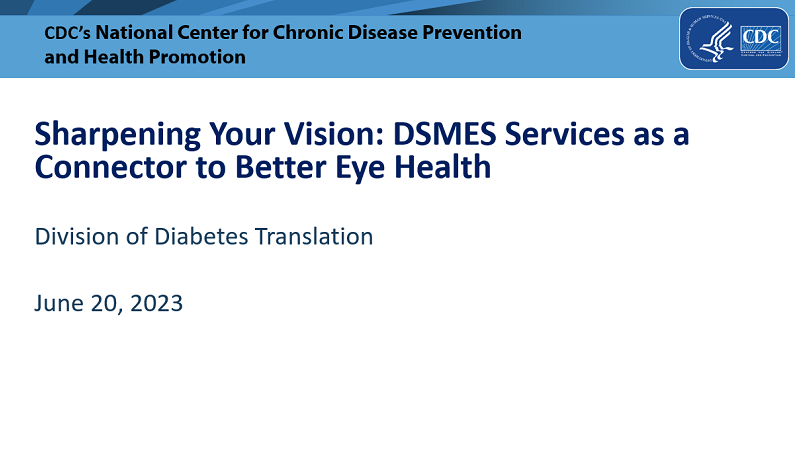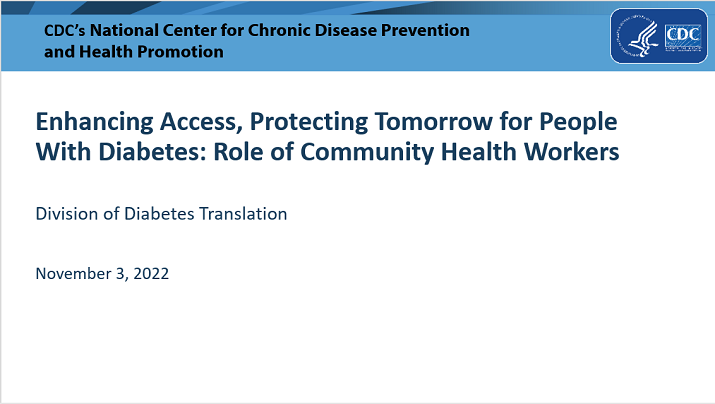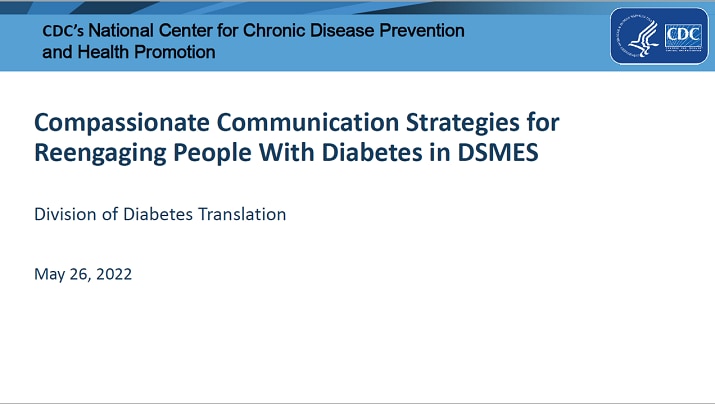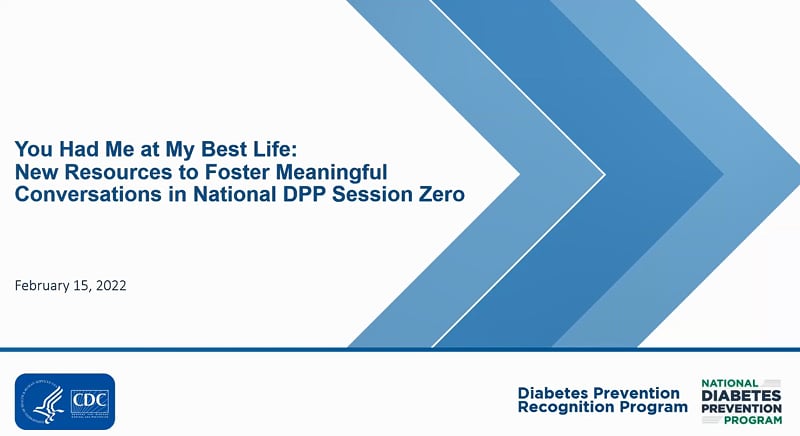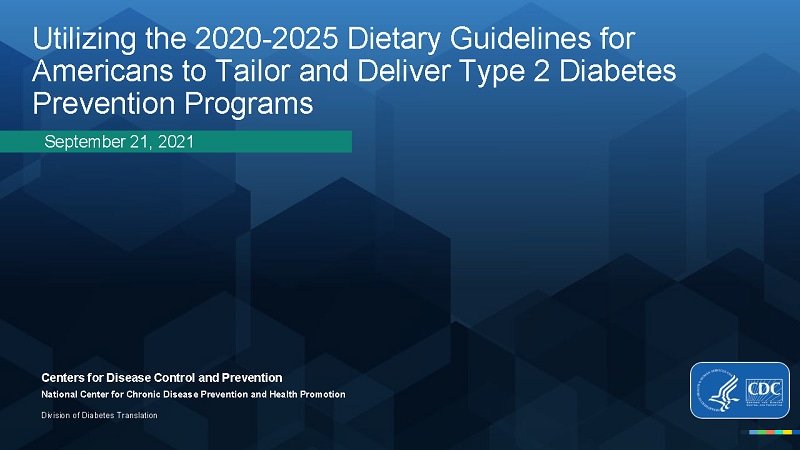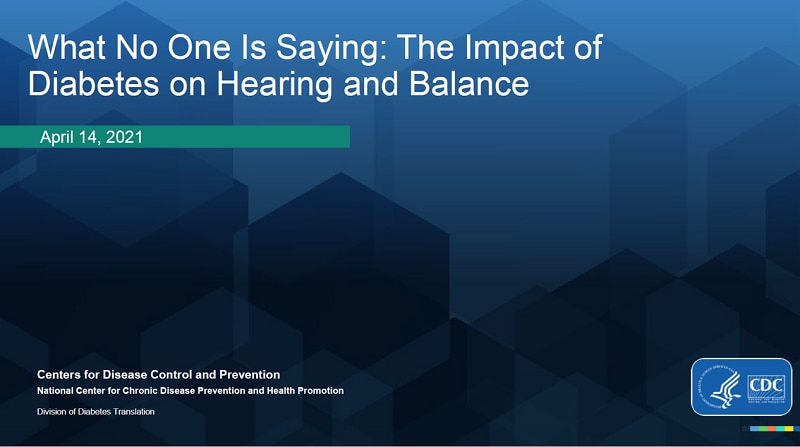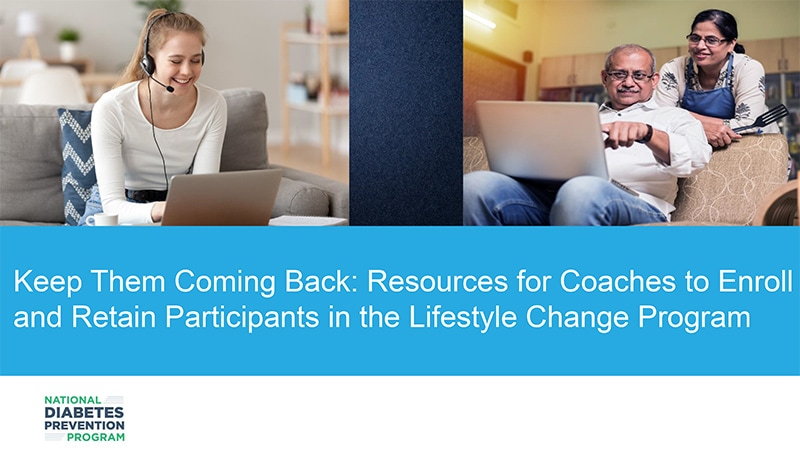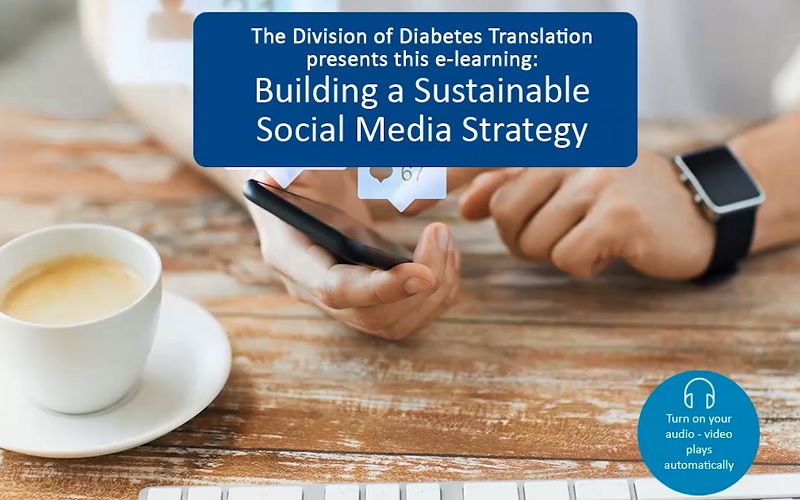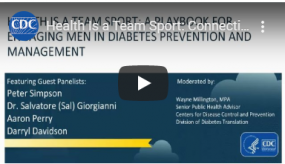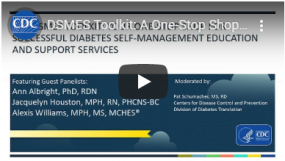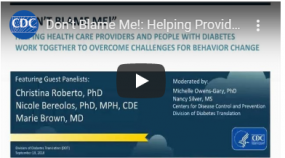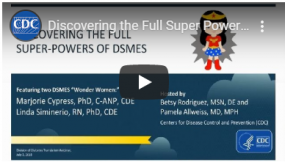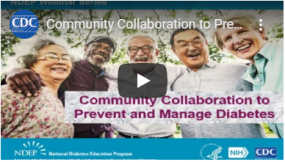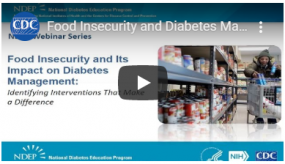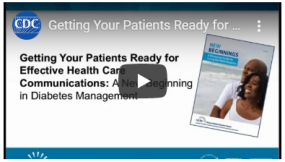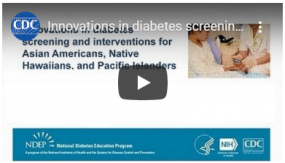Webinars and Videos
Enhance your professional development with webinars and videos. Learn new approaches for engaging communities, increasing cultural competence, and promoting diabetes prevention and management.
Sharpening Your Vision: DSMES Services as a Connector to Better Eye Health
Eye health complications of any kind, if left untreated, can lead to wide ranging social and economic impacts on individuals with diabetes, their families, and communities. Limited awareness that diabetes can cause vision impairment and loss, combined with barriers to care mean that many people do not have adequate access to vital sight-saving and support services. In this one-hour webinar brought to you by CDC’s Division of Diabetes Translation, a panel of experts will offer essential background on the relationship between diabetes and eye health, and highlight strategies for identifying and managing vision problems, as well as delivering DSMES services that can be supported by diabetes care and education specialists, community health workers, and more.
Read the transcript [PDF – 305 KB]
Download the slides [PDF – 3 MB]
Continuing Education (CE) Information:
In order to receive continuing education (CE) for WD4371-052622 – Innovations in Diabetes Behavior Change – May 26, 2022 (Web on Demand), please visit TCEO and follow these 9 Simple Steps before July 25 2025.
The Course Access Code is Diabetes.
Enhancing Access, Protecting Tomorrow for People with Diabetes
Approaches to delivering diabetes self-management education and support (DSMES) services are called to emphasize the “whole person” and be inclusive of an individual’s mental health, behavioral and lifestyle factors, and their social and economic environments. But is this model attainable and how can we make it more so? Listen as experts from the CDC, Division of Diabetes Translation, and the Association of Diabetes Care & Education Specialists discuss the International Diabetes Federation’s 2022 theme: “Access to Care: Education to Protect Tomorrow.” Opportunities and challenges of team-based care are shared, as well as the value of community health workers in reducing health inequities.
CEU info to follow!
Read the transcript [PDF – 223 KB]
Download the slides [PDF – 1 MB]
In order to receive continuing education (CE) for WD4371-110322 – Innovations in Diabetes Behavior Change – November 3, 2022 (Web on Demand), please visit TCEO and follow these 9 Simple Steps before December 6, 2024.
The Course Access Code is Diabetes.
Compassionate Communication to Reengage People With Diabetes in DSMES
Tracking blood sugar, managing medication, planning meals, staying active—it’s a lot to think about. It can leave someone with diabetes feeling run down and overwhelmed. On top of this, is the recognition that many people are starting to return to regular activities for the first time since the pandemic started. For people with diabetes, this return can come with stress about how their health care providers will respond to their progress in taking care of their health. In this 60-minute webinar, presented by the CDC, Division of Diabetes Translation, experts will offer communication and coaching approaches for offering care that is compassionate, understanding, and patient-centered.
Read the transcript [PDF – 209 KB]
Download the slides [PDF – 5 MB]
In order to receive continuing education (CE) for WD4371-052622 – Innovations in Diabetes Behavior Change – May 26, 2022 (Web on Demand), please visit TCEO and follow these 9 Simple Steps before June 28, 2024.
The Course Access Code is Diabetes.
You Had Me at My Best Life: New Resources to Foster Meaningful Conversations in National DPP Session Zero
CDC experts will introduce a new suite of materials for supporting their version of Session Zero, the Discovery Session, designed to help you recruit and enroll participants into your National DPP lifestyle change program. Experts will also present learnings from organizations currently using Session Zero and share the overall conceptual framework that was used to create the new Discovery Session resources. Finally, a National DPP lifestyle change coach will share their insights and experiences using CDC’s Discovery Session resources, and we will hear from a diabetes self-management education and support (DSMES) services expert on how these concepts and strategies might be applied to DSMES.
Read the transcript [PDF – 373 KB]
Download the slides [PDF – 3 MB]
In order to receive continuing education (CE) for WD4371-021522 – Innovations in Diabetes Behavior Change – February 15, 2022 (Web on Demand), please visit TCEO and follow these 9 Simple Steps before 03/22/2024. Read the accreditation statement.
The Course Access Code is Diabetes.
Utilizing the 2020-2025 Dietary Guidelines for Americans (DGAs) to Tailor and Deliver Type 2 Diabetes Prevention Programs
This webinar presents the 2020-2025 Dietary Guidelines for Americans, highlights nutrition content in the PreventT2 curriculum, and offers strategies for addressing culture and health equity.
In order to receive continuing education (CE) for WD4371-092121 – Innovations in Diabetes Behavior Change – September 21, 2021 (Web on Demand), please visit TCEO and follow these 9 Simple Steps before October 26 2023. Read the accreditation statement.
The Course Access Code is Diabetes.
Read the transcript [PDF – 289 KB]
Download the slides [PDF – 9 MB]
What No One is Saying: The Impact of Diabetes on Hearing and Balance
This webinar explains the relationships between blood sugar management, hearing loss, balance, and risk of falls, as it relates to both prediabetes and diabetes.
Read the transcript [PDF – 402 KB]
Download the slides [PDF – 4 MB]
Credit is available for this webinar. Click here for more information and to receive credit. Read the accreditation statement.
CE Course Access Code: Diabetes
CE Expiration Date: May 18, 2023
Ear Health and Diabetes Quick Learn (30:44)
This quick learn was created from a previously presented webinar (2021). It features segments on the relationships between blood sugar management, hearing loss, balance, and risk of falls, as it relates to both prediabetes and diabetes. (Note: There is no CE available for the quick learn version.)
Keep Them Coming Back: Resources for Coaches to Enroll and Retain Participants in Lifestyle Change Programs
This webinar will highlight communication, marketing, and engagement tools for coaches in the National Diabetes Prevention Program (DPP) Lifestyle Change Program. CDC experts will demonstrate marketing resources that are tailored to specific audiences, including working adults and older adults who are eligible for the Medicare DPP. The presenters will also share tools (i.e. Personal Success Tool, Champion Toolkit) to help support efforts to recruit and retain participants.
Read the transcript [PDF – 165 KB]
Download the slides [PDF – 4 MB]
Credit is available for this webinar. Click here for information about continuing education for this webinar [PDF – 55 KB]. Read the accreditation statement.
Web on demand: Expiration Date July 28, 2022
To receive continuing education click here
Quick Learn: Building a Sustainable Social Media Strategy
The nuts and bolts of creating a social media strategy to build engagement with your audience to promote diabetes self-management and type 2 diabetes prevention.
Quick Learn: Cultural Adaptation of Materials
Simple and inexpensive ways to make your diabetes management and type 2 diabetes prevention materials more relevant to your audiences by making them more culturally relevant.
Read the transcript [PDF – 236 KB]
Download the handout [PDF – 235 KB]
Health Is a Team Sport: Connecting Men to Resources for Diabetes Prevention and Management
Diabetes affects more than 37 million American adults, and 96 million adults have prediabetes, putting them at a high risk for developing type 2 diabetes. It is well documented that men in minority communities are disproportionately affected by this chronic disease and are often reluctant to seek screening or participate in lifestyle change programs. Today more than ever, it is essential to understand and address the many needs of this hard-to-reach population. This webinar will offer strategies for engaging men in DSMES and other diabetes programs.
The DSMES Toolkit: Your One-Stop Shop for Successful Diabetes Self-Management Education and Support Services
Diabetes self-management education and support (DSMES) services can improve behavior change in people living with diabetes and help meet provider benchmarks. CDC created the DSMES Toolkit to provide centralized resources to assist with the development, promotion, and implementation of DSMES services. Learn how to unpack the DSMES Toolkit resources to build the business case for DSMES, establish and deliver services, spark referrals, maximize reimbursement, and increase participation in DSMES. Learn more about DSMES.
Read the transcript [PDF – 269 KB]
Download the slides [PDF – 1.39 MB]
Don’t Blame Me!: Helping Providers and People with Diabetes Overcome Challenges for Behavior Change
Let’s face it, behavior change can be challenging. People with diabetes need to make lifestyle changes to control their glucose levels and avoid complications, but it’s not simply a matter of will power. When people with diabetes fall short, sometimes the environment is often to blame. Providers may feel blame, too. This webinar discusses self-care behaviors to help address their emotional needs.
Read the transcript [Word – 66 KB]
Web on demand: Start Date: May 30, 2019 – Expiration Date October 23, 2020
To receive continuing education click here
Discovering the Full Super Powers of DSMES
In this 90-minute webinar, a panel of “wonder women” in diabetes education discusses the four critical time points to assess, provide, and adjust diabetes self-management education/support. The webinar highlights a toolkit created by these national organizations to assist diabetes educators and others with sharing the information and recommendations included in the joint position statement. Webinar speakers showcase the mystery of DSMES though a role-play showcasing tips to use this position statement to increase referrals to DSMES services.
Read the transcript [PDF – 357 KB]
Web on demand: Start Date: November 27, 2017 – Expiration Date October 27, 2019
To receive continuing education click here
Community Collaboration to Prevent and Manage Diabetes
Collaboration involving a variety of partners is critical to the delivery of effective and efficient type 2 diabetes prevention and management education within high risk/high burden communities. Webinar participants will hear how diabetes prevention and management is being addressed through community collaboration in rural, urban and high-risk/high-burden settings.
Read the transcript [PDF – 513 KB]
Community Collaboration Quick Learn (9:15)
This quick learn was created from a previously presented webinar (2017). It features segments on the role of faith communities, food banks, and community coalitions as partners for organizations working in the area of type 2 diabetes prevention and diabetes management. (Note: There is no CE available for the quick learn version.)
Food Insecurity and Its Impact on Diabetes Management: Identifying Interventions That Make a Difference
Food insecurity can negatively affect health outcomes. It can impact diabetes self-management, glucose control, health care utilization, and one’s ability to cope with a chronic illness. This NDEP webinar will focus on defining food insecurity, its association with diabetes, and strategies that diabetes educators, health educators, and community health workers can use to help people with diabetes improve self-care.
Read the transcript [PDF – 442 KB]
Food Insecurity Quick Learn (11:00)
This quick learn was created from a previously presented webinar (2017). It features segments on the definition of food insecurity, its association with diabetes, and some possible implications for clinical and community-based organizations. (Note: There is no CE available for the quick learn version.)
Getting Your Patients Ready for Effective Health Communications: A New Beginning in Diabetes Management
Effective patient-provider communication is the foundation for providing patient-centered diabetes care. Webinar presenters describe strategies that diabetes educators, health educators, and community health workers can use to enhance and improve patient-provider communication. Also, learn how diabetes educators are using the New Beginnings Discussion Guide to address this essential topic in diabetes self-management education.
Read the transcript [PDF – 136K]
Web on Demand: Start Date June 21, 2016 – Expiration Date October 27, 2019
Innovations in Diabetes Screening and Interventions for Asian Americans, Native Hawaiians, and Pacific Islanders
In this webinar, presenters share information about new diabetes screening guidelines for Asian Americans and describe innovative diabetes education approaches that have been used with AANHPI populations.
